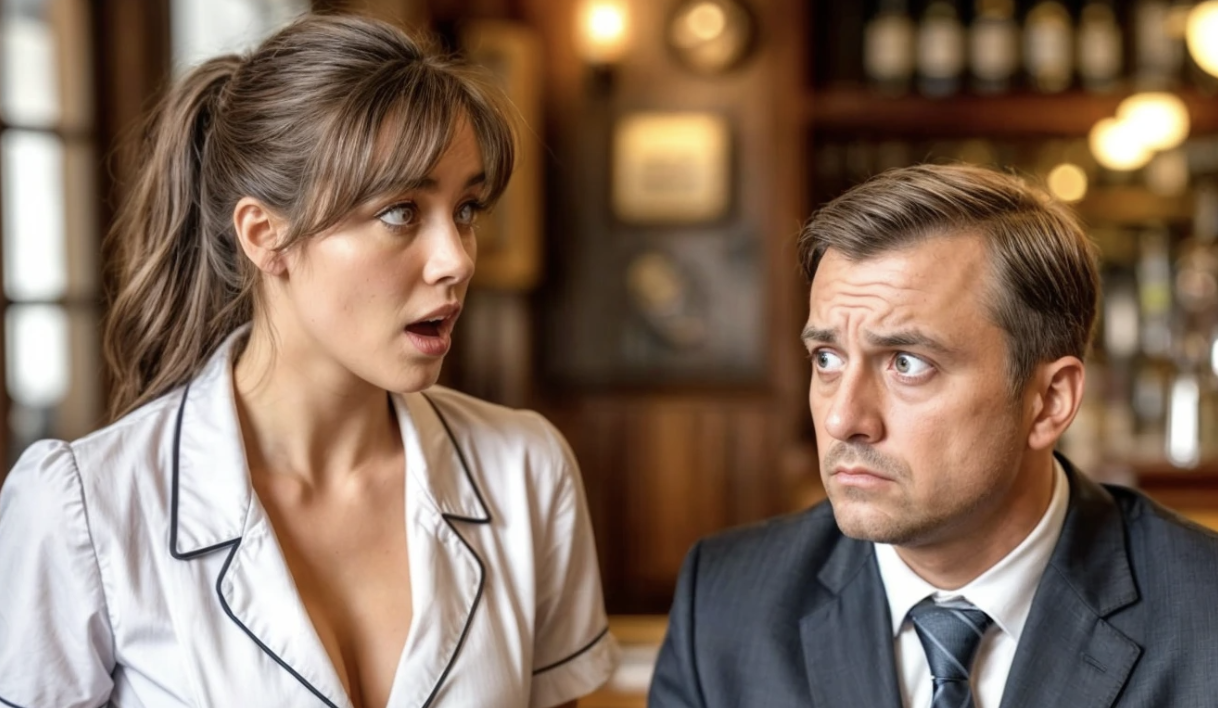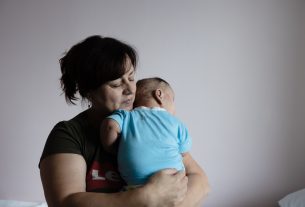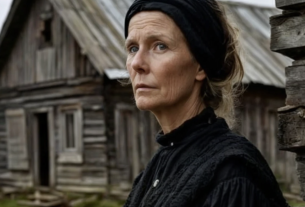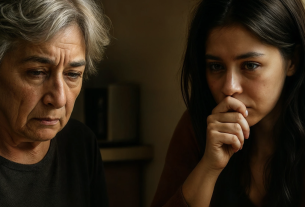The evening at the café was going as usual—calm, measured, as if time itself decided to linger on this cozy note. Anya skillfully carried orders, moving between tables with her usual grace, as if she knew every step in advance. Her movements were precise, her face lit up with a friendly smile, and her voice was so soft that even the most reserved customers responded warmly. She was good at her job: attentive, neat, always finding the right words for every visitor. Outside, the rain poured steadily—quiet but heavy, as if the city was weeping somewhere beyond the glass. Inside, the atmosphere was warm and homely—the smell of freshly brewed coffee, crispy croissants, cinnamon, and something else indistinctly familiar. This café had become a refuge from the hustle and quarrels, from loneliness and worries for many. And for Anya as well.
She was just about to clear the dirty dishes from the fifth table—the one by the fireplace, where usually a couple of pensioners or students with laptops sat—when the door opened again. A gust of cold air swept in along with raindrops. Customers fell silent for a moment; someone glanced toward the entrance but quickly returned to their business. To everyone else, he was just another visitor. But not to Anya.
The man entered confidently, although his clothes looked worn and clearly hadn’t seen a washing machine in a long time. He was tall, broad-shouldered, wearing a gray coat soaked through, clinging tightly to his body. His boots thudded heavily on the floor, leaving wet footprints. Without looking around the room, he headed to the far corner by the window—the quietest spot in the café, rarely visited by newcomers. Only then did Anya look up… and meet his gaze.
The tray slipped from her hands as if her muscles suddenly lost strength. The dishes crashed loudly to the floor; porcelain shards scattered like frightened creatures. Conversations in the room froze. Someone gasped in surprise, someone turned around to understand what happened. But Anya heard nothing. She felt neither cold nor the smell of coffee, nor even breathing. In front of her, a few meters away, sat a man she thought was dead.
“Maxim?..” she whispered, almost soundlessly, like a last breath.
The man slowly raised his head. His face was so familiar that pain pierced her chest as if someone had torn her memories out barehanded. Everything was there—the cheekbone line, the slight bump on his nose, those eyes… The very eyes she used to lose herself in, that looked at her with tenderness, confidence, and a promise of eternity. The gaze was different—colder, distant, unfamiliar. But it was him. She would recognize him among millions.
Anya didn’t remember how she got closer. She didn’t notice walking across the hall, stepping over the shards, how people fell silent, watching her with worried eyes. Now her world narrowed down to one person. She stood before him—trembling, with wet cheeks, unaware she was crying.
“Is that you?..” she whispered, almost praying. “It’s you… alive?..”
The man was silent for a long time. He looked at her as if trying to find any trace in his memory. His hands rested on his knees—calm, but tense. Finally, he stood up. Placed his palms on the table, leaning as if to keep from falling.
“Sorry, you must be mistaken,” he said at last, his voice even, almost official. “My name is Artyom.”
The word hung in the air like a blow. Anya stepped back as if pushed away. But no. It couldn’t be a mistake. It was him. Maxim. Her husband. The man she had lived with for seven years, the one she loved, the one she had buried with her own hands.
“You died…” she barely whispered. “I buried you myself…”
He frowned, a flicker of concern, perhaps even sympathy, appearing in his eyes. He pulled out a wallet, carefully opened it, and showed a passport:
“See? Artyom Leonov. I’ve never been married. Sorry…”
Anya stepped back again. Her heart was pounding anxiously as if warning: “Something’s wrong.” Everything around began to blur, as if reality started to crack at the seams. She wanted to say something, but words stuck in her throat.
Then Lera approached her—her replacement, a young girl with a gentle character and sharp mind.
“I’ve seen him before,” she whispered in her ear. “He came two months ago, asked the names of those who work here. But didn’t come in. Strange guy…”
Anya turned around. But the man was already walking toward the exit. She ran after him, rushed outside—and only managed to see the door of a black car slam shut. The car drove away. Only the smell of rain, wet asphalt, and… a note remained.
On the wet paper, blurred by water, there were just a few lines:
“Sorry. It was for your life. I’ll explain everything… Soon.”
Anya stood in the rain, clutching the soaked note. Her heart was beating as it did the first time Maxim asked her to marry him. Only now, instead of joy, there was burning anxiety, fear, and a question that wouldn’t let her rest:
Who is he really?
The next morning began with determination. Anya didn’t return to the café. She changed in the back room, threw the keys to Lera, and left into the night. Her head was buzzing with thoughts. Everything happening seemed like a crazy dream, but memory wouldn’t let her close her eyes and forget.
“For your life… What does that mean?”
She remembered the accident. That terrible morning when she was told Maxim hadn’t returned from a business trip. His car was found in a ditch, broken and overturned. The body was identified by documents and bits of clothing. The face was barely recognizable. Then she thought: yes, it was him… But now—doubts grew like a snowball.
The next morning she started with archives. She found the phone number of the investigator who handled the case. He had already retired but agreed to meet. They met in a small coffee shop on the edge of town.
“Do you want to know the truth, Anya?” he asked, brewing tea. “Then listen.”
The old man took out an old folder. The inscription on the cover was barely readable:
CASE No. 7834 — DEATH OF M. GORELOV.
“Your husband… did not die then,” he said, looking straight into her eyes. “He was included in the witness protection program. He became a key participant in a very dangerous case. It involved corruption at the highest levels—high-ranking officials, contracts, murders. They tried to eliminate him. But the FSB managed to save him. They moved him under another name. We were ordered to declare him dead. For your safety.”
“Why wasn’t I told?” Anya gasped.
“You were under suspicion. They feared you might slip up. He didn’t know either. He begged to contact you, but the order was strict. Then they gave him a new life. A new passport. That’s all.”
Anya was silent, clenching her fists.
“And now?” she finally exhaled. “Why did he come back?”
“That means the threat returned,” the old man answered grimly. “Or… he decided he no longer wants to live in the shadows.”
That same night, her phone rang from a hidden number.
“Anya,” a voice she hadn’t heard in seven years spoke. “Sorry. I’ve been watching you all this time. But they found out. Now you’re in danger too.”
“Who are they?!”
“Those who wanted me dead then. I can’t drag you into this, but you must know: if I disappear again—it won’t be by my will.”
He sent an address:
“Tomorrow. 21:00. Don’t be late.”
Anya arrived on time. An old dacha outside the city, dilapidated, with an overgrown garden and a porch ready to collapse. Silence, broken only by crickets and distant barking dogs. Maxim waited inside—alive, exhausted, with eyes still holding love.
But as soon as they embraced, footsteps sounded outside. Headlights, the crunch of twigs, heavy boots on wet ground.
“It’s too late…” he whispered. “They found us.”
Maxim rushed to the back door.
“Run,” he whispered. “There’s an old trail in the forest. I’ll distract them!”
“No!” Anya grabbed his hand. “I lost you once already. I won’t survive a second time!”
But outside, silhouettes were already flickering. Four people. One with a thermal imager. Another with a pistol, the silencer gleaming in the moonlight. These were not just people—they were executioners, professionals for whom death was part of the job.
Maxim pulled an old pistol from the closet—still from his army days. Checked the magazine. Reloaded with trembling fingers.
“I didn’t live my own life anyway, Anya…” he whispered. “At least let me die—for real.”
Anya looked into his eyes—and understood: fear had died in him long ago. Only determination remained.
“Then together,” she said softly.
And at that moment, the door flew off its hinges.
A shot. Another.
A scream. The sound of bodies hitting the floor.
An hour later, everything was quiet. FSB officers arrived. They came on a tip-off. Too late… almost.
Three attackers were dead. One wounded. Maxim—alive. With a severe shoulder wound. Anya—safe. She had been sitting next to him the whole time, holding his head to her chest.
“You caught me when I was no longer afraid,” Maxim said as they loaded him into the ambulance. “But thank you. I was able to hold my wife. And I’m not running anymore.”
Six months later, they lived in another country. New surname, new house, new names. But now—together. No fear, no lies. He worked as a history teacher. She opened a small café, cozy, smelling of cinnamon and coffee.
Sometimes strange letters arrived without return addresses. Sometimes strangers with attentive looks came into the café.
But the main thing—she woke up next to him every morning. Real. Alive.
And never let go again.



